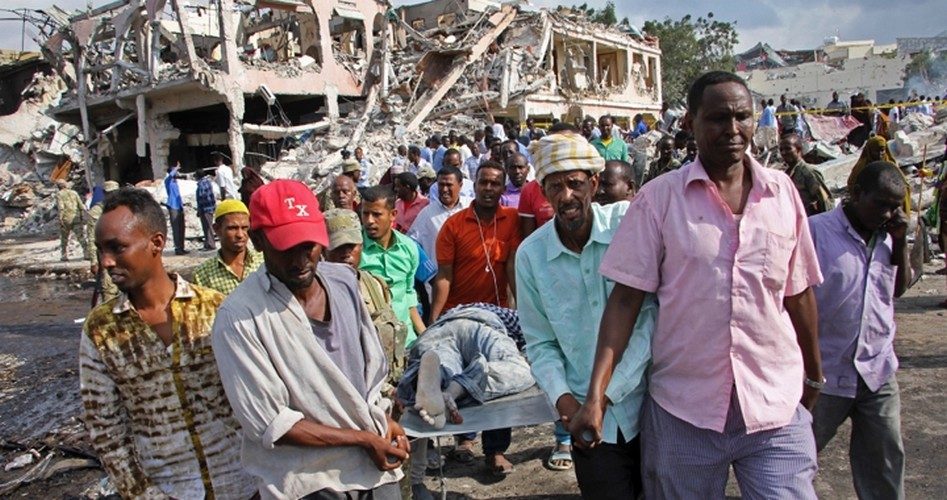
The killing of over 300 people in a bomb attack in Somalia may have been motivated by an American military raid in the country carried out in August.
As reported by Jason Burke for The Guardian:
Investigators believe the attack on Saturday may in part have been motivated by a desire for revenge for the botched US-led operation in August.
Al-Shabaab has not claimed responsibility for Saturday’s attack but a member of the cell detained by security forces has told interrogators the group was responsible, one security official told The Guardian.
Following the raid, in which three children aged between six and 10 died, local tribal elders called for revenge against the Somali government and its allies.
Not only was the bomber from the specific community targeted by the raid, but the investigation is also uncovering a series of other links to the town where it took place.
The raid in question was conducted by the Somali military with “support” provided by the U.S. African Command (AFRICOM). As reported by the New York Times:
Ten civilians, including three children, were killed in a raid by foreign and Somali forces on a farm in southern Somalia, a deputy governor said Friday. The United States military confirmed that it had supported a counterterrorism operation in the area, and said it would look into the allegations.
And:
The farmers were killed “one by one” after soldiers stormed into the village, Barire, early Friday, the deputy governor of the Lower Shabelle region, Ali Nur Mohamed, told reporters in the capital, Mogadishu.
And:
“Three children ages 8 to 1 and a woman were among the dead, the deputy governor said. Their bodies were laid out in a grassy courtyard, wrapped in blankets.”
And, finally, and perhaps most despicably:
“These local farmers were attacked by foreign troops while looking after their crops,” Mr. Mohamed told reporters. “The troops could have arrested them, because they were unarmed, but instead shot them one by one mercilessly.”
How did the U.S. military in the region respond to its involvement in the apparent slaughter of innocent children? The New York Times reported:
“We are aware of the civilian casualty allegations near Barire, Somalia,” the command said in a statement. “We take any allegations of civilian casualties seriously, and per standard, we are conducting an assessment into the situation to determine the facts on the ground.”
Could the killing of children and other innocent civilians by the United States and its “allies” in the War on Terror push citizens of targeted nations to turn to violence to demonstrate opposition to the ongoing military presence?
Such a reaction is called blowback.
Blowback is defined as violent counter-attacks carried out as revenge for armed military strikes that have killed thousands, many of whom were doing nothing more threatening than going to the market or attending a funeral.
It’s not as if no one saw this threat coming.
In a statement released in 2012 by then-Representative Ron Paul, he explained that the threat to our liberty posed by the president’s proliferation of the drone war was more imminent than the danger to our national security posed by alleged militants:
“This dramatic increase in the use of drones and the lowered threshold for their use to kill foreigners has tremendous implications for our national security, ” he said, adding, “At home, some claim the use of drones reduces risk to American service members. But this can be true only in the most shortsighted sense. Internationally the expanded use of drones is wildly unpopular and in fact creates more enemies than it eliminates.”
These military operations not only kill scores of innocent people, but they ignite blowback among the survivors, leading to calls for more drone strikes — and the vicious cycle spins on.
Inside this wheel of violence is a triangle-shaped spoke of interests: the United States, the central governments of the countries of the Middle East and Africa, and the tribal communities that live under their rule.
These tribes seek autonomy and delivery from oppressive central governments, while the United States seeks to prop up those same autocratic regimes. Ironically, this relationship simultaneously benefits the U.S. government and al-Qaeda, the latter having now “found these tribes to be receptive hosts.” Not, however, for reasons of religious simpatico, but rather because the common goal of fighting domestic central governments and the deadly intervention of the United States makes these two groups ad hoc allies.
Additionally, the constantly changing goal of the “War on Terror” makes it very difficult to attract allies to the American cause among tribal groups. How can local leaders side with the United States when they have no idea which mission they’re enlisting to achieve?
Speaking specifically of Somalia, in a report published in April, the Bureau of Investigative Journalism estimated that since 2004, at least 300 people have been killed in Somalia as a result of at least 42 confirmed U.S. drone strikes.
Regardless of the civilian body count, the claque of neocons in Congress and without (not to mention their billion-dollar benefactors in the military-industrial complex) deny the role of blowback in the ongoing terrorist activities aimed at Western concerns. Furthermore, the shrinking of markets through the reduction in enormous regional combat operations is unacceptable, regardless of the collateral damage, including that done to the rule of law and the Constitution.
Photo of body being removed after bomb attack in Mogadishu, Somalia: AP Images



